新人教版选修6 Unit 2 Poems知识点课件(47张ppt)
文档属性
| 名称 | 新人教版选修6 Unit 2 Poems知识点课件(47张ppt) |
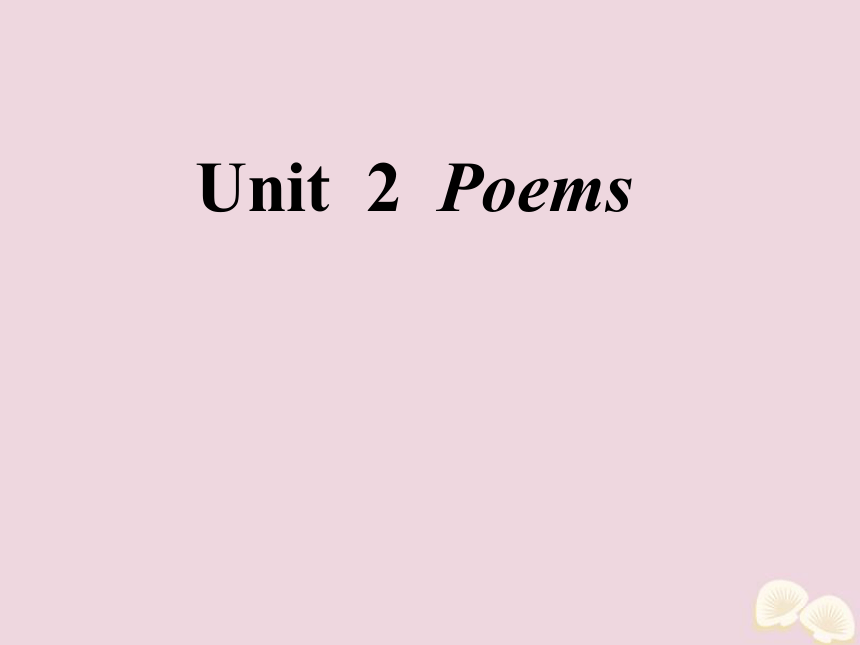
|
|
| 格式 | zip | ||
| 文件大小 | 643.5KB | ||
| 资源类型 | 教案 | ||
| 版本资源 | 人教版(新课程标准) | ||
| 科目 | 英语 | ||
| 更新时间 | 2019-08-25 00:00:00 | ||
图片预览

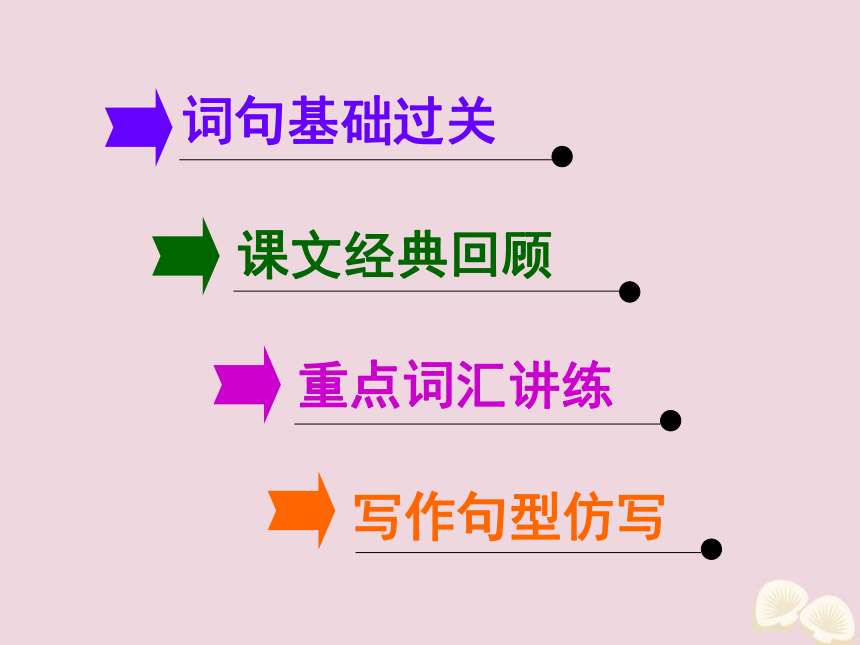

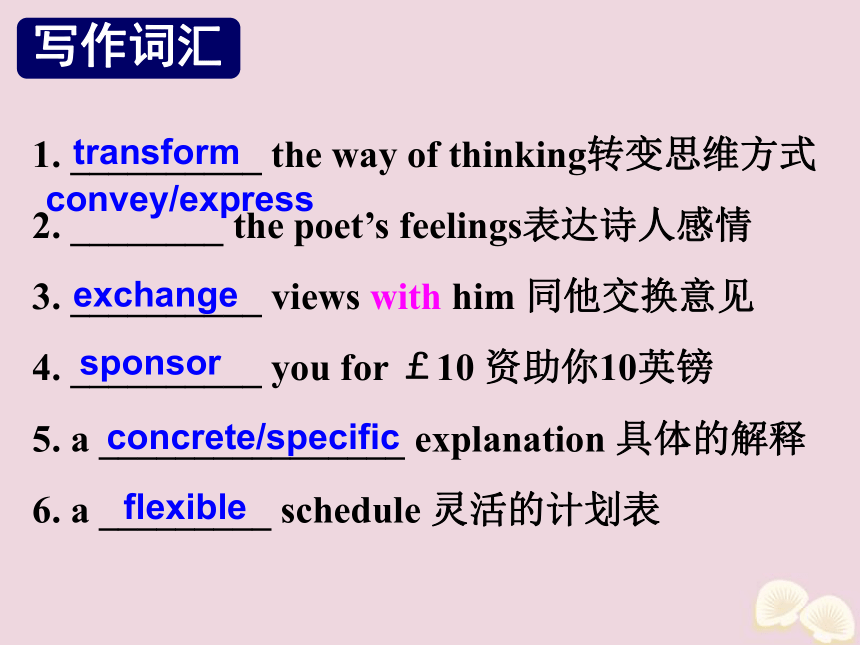
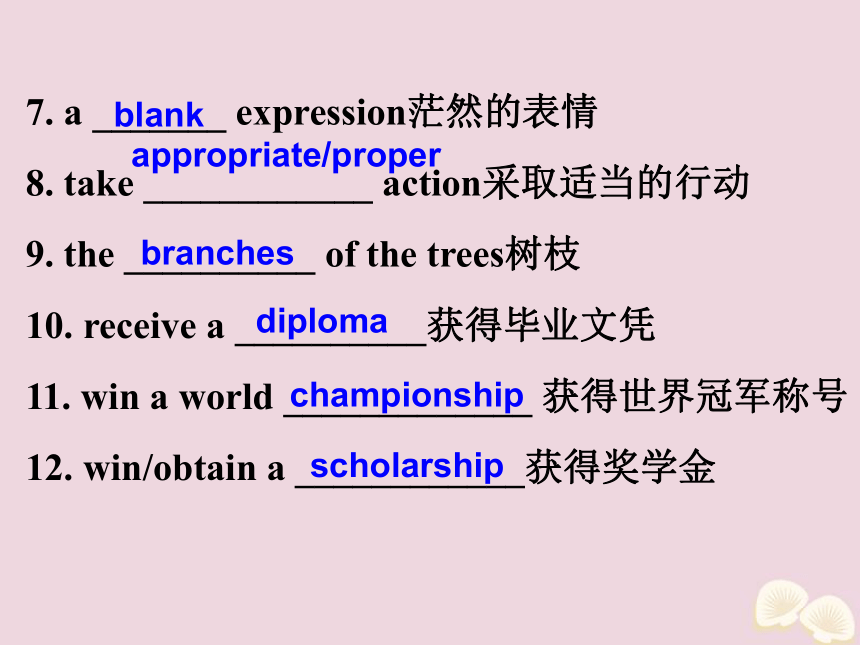
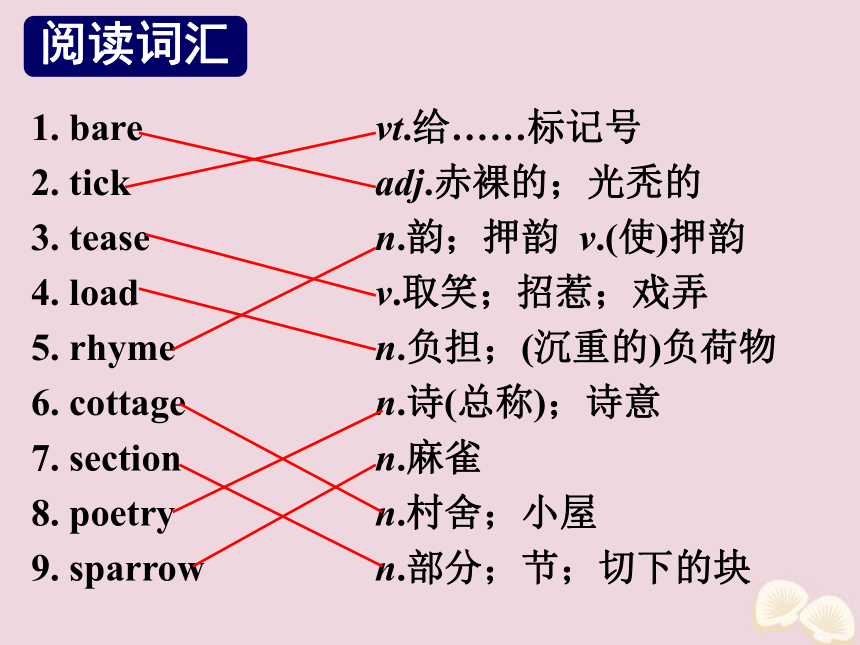
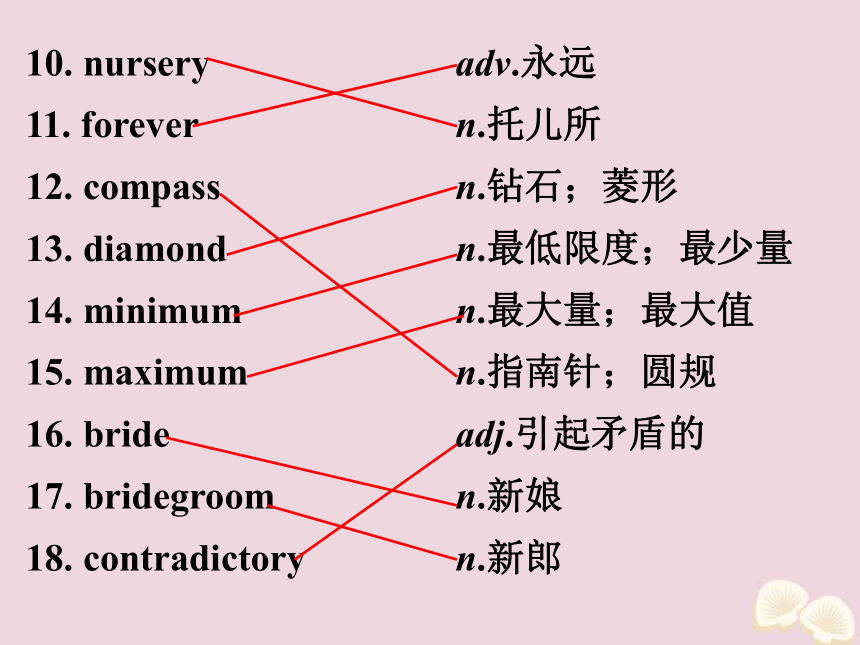
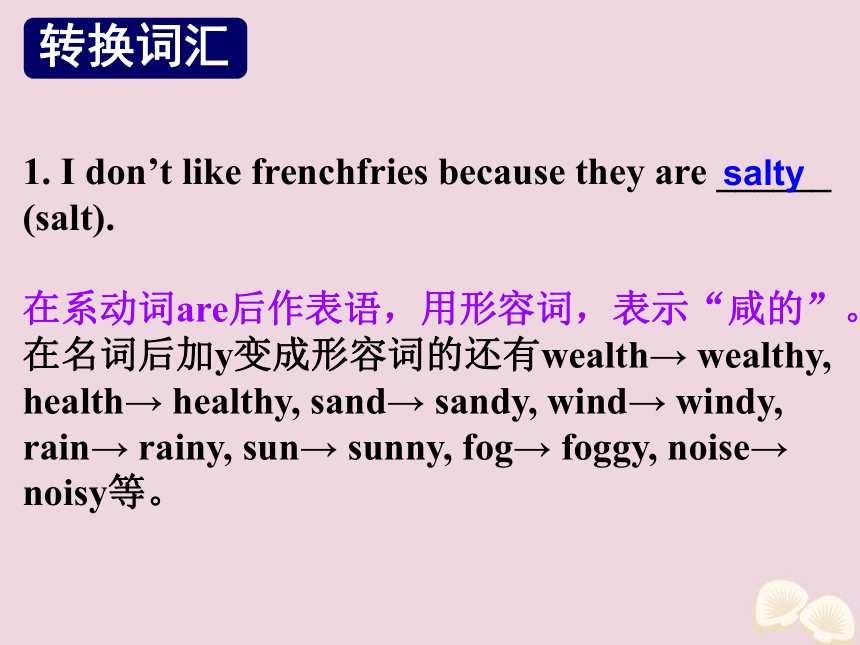
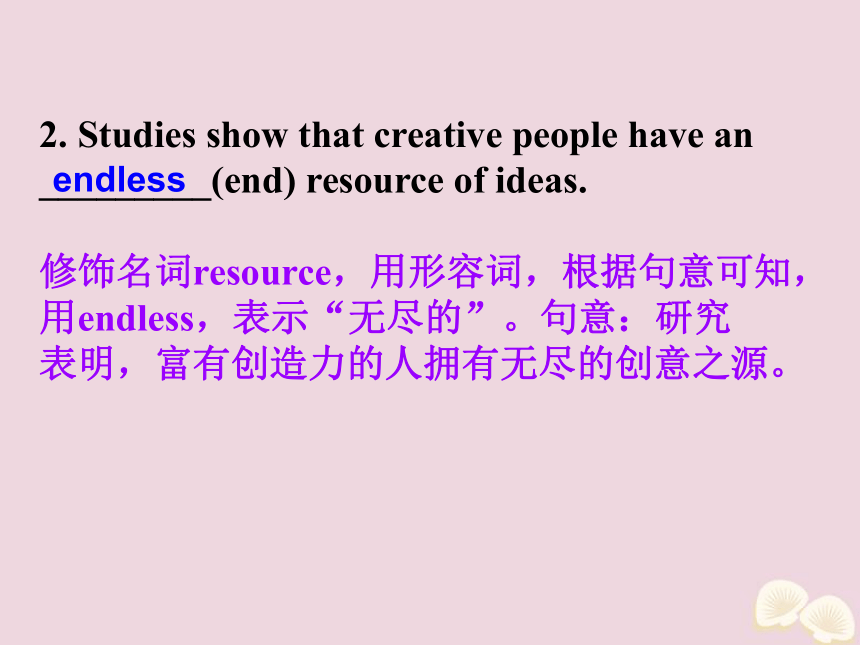
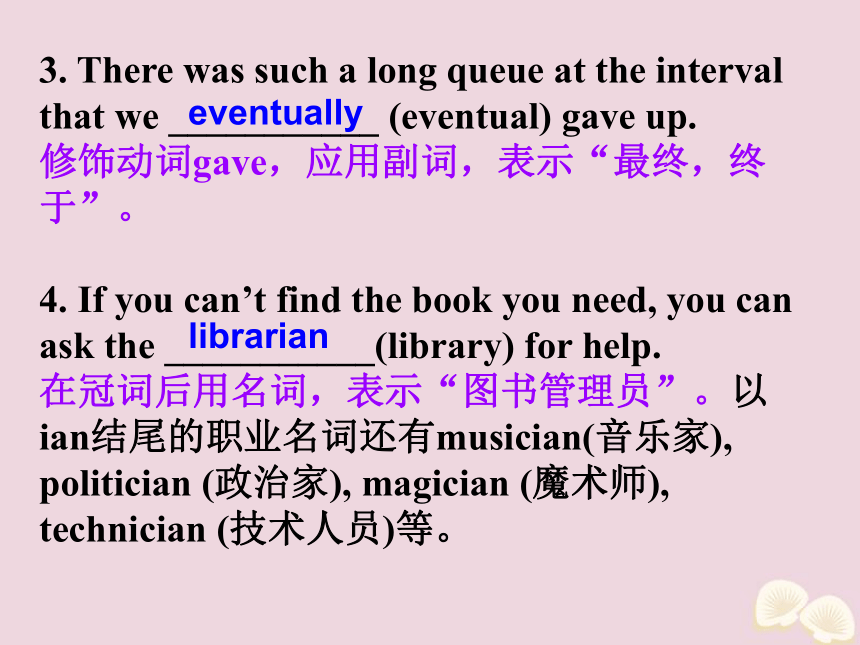
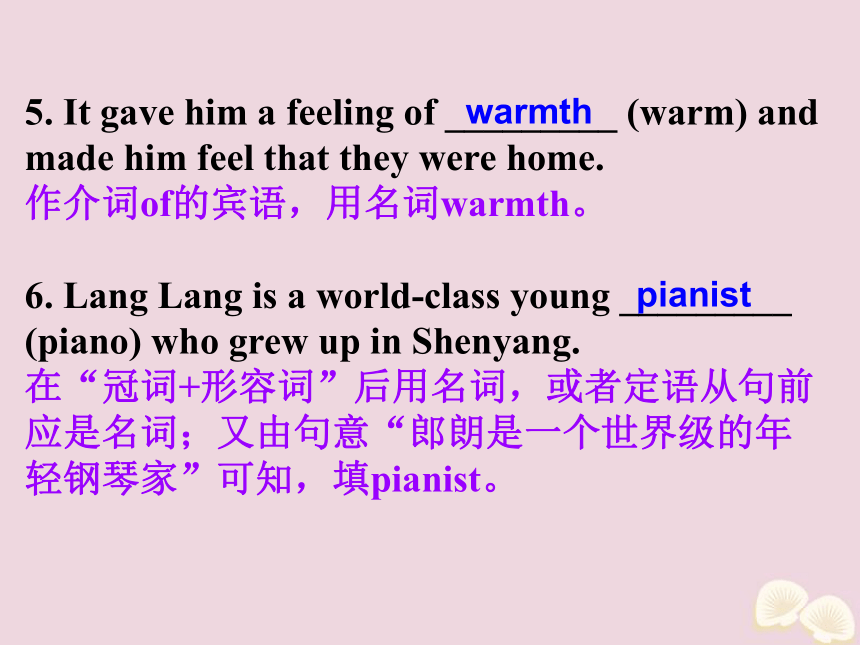

文档简介
(共47张PPT)
Unit 2 Poems
课文经典回顾
重点词汇讲练
写作句型仿写
词句基础过关
1. __________ the way of thinking转变思维方式
2. ________ the poet’s feelings表达诗人感情
3. __________ views with him 同他交换意见
4. __________ you for £10 资助你10英镑
5. a ________________ explanation 具体的解释
6. a _________ schedule 灵活的计划表
flexible
transform
convey/express
exchange
sponsor
concrete/specific
7. a _______ expression茫然的表情
8. take ____________ action采取适当的行动
9. the __________ of the trees树枝
10. receive a __________获得毕业文凭
11. win a world _____________ 获得世界冠军称号
12. win/obtain a ____________获得奖学金
scholarship
blank
appropriate/proper
branches
diploma
championship
1. bare vt.给……标记号
2. tick adj.赤裸的;光秃的
3. tease n.韵;押韵 v.(使)押韵
4. load v.取笑;招惹;戏弄
5. rhyme n.负担;(沉重的)负荷物
6. cottage n.诗(总称);诗意
7. section n.麻雀
8. poetry n.村舍;小屋
9. sparrow n.部分;节;切下的块
10. nursery adv.永远
11. forever n.托儿所
12. compass n.钻石;菱形
13. diamond n.最低限度;最少量
14. minimum n.最大量;最大值
15. maximum n.指南针;圆规
16. bride adj.引起矛盾的
17. bridegroom n.新娘
18. contradictory n.新郎
1. I don’t like frenchfries because they are ______ (salt).
在系动词are后作表语,用形容词,表示“咸的”。在名词后加y变成形容词的还有wealth→ wealthy, health→ healthy, sand→ sandy, wind→ windy, rain→ rainy, sun→ sunny, fog→ foggy, noise→ noisy等。
salty
2. Studies show that creative people have an _________(end) resource of ideas.
修饰名词resource,用形容词,根据句意可知,用endless,表示“无尽的”。句意:研究
表明,富有创造力的人拥有无尽的创意之源。
endless
3. There was such a long queue at the interval that we ___________ (eventual) gave up.
修饰动词gave,应用副词,表示“最终,终于”。
4. If you can’t find the book you need, you can ask the ___________(library) for help.
在冠词后用名词,表示“图书管理员”。以ian结尾的职业名词还有musician(音乐家), politician (政治家), magician (魔术师), technician (技术人员)等。
eventually
librarian
5. It gave him a feeling of _________ (warm) and made him feel that they were home.
作介词of的宾语,用名词warmth。
6. Lang Lang is a world-class young _________ (piano) who grew up in Shenyang.
在“冠词+形容词”后用名词,或者定语从句前应是名词;又由句意“郎朗是一个世界级的年轻钢琴家”可知,填pianist。
warmth
pianist
7. Not only was Einstein a famous scientist, but he was also a fairly good _________(violin).
在“冠词+形容词”后用名词;又由句意可知爱
因斯坦“还是一个相当不错的小提琴家”,故填violinist。
violinist
8. It is difficult to convey delicate shades of meaning in a ____________ (translate).
作介词in的宾语,或者说在冠词a后,用名词,表示“译文”。句意:在译文中传达意义
上细微的差别是很不容易的。像这样去e加
ion变成名词的有很多,如:
graduate → graduation (毕业),
celebrate→ celebration(庆祝, 庆祝会), congratulate→ congratulation(祝贺), decorate→ decoration(装饰),
educate→ education(教育),
operate→ operation(手术, 操作)等。
translation
9. He turned his head and saw a figure approaching in the __________ (dark).
作介词in的宾语,或者说在冠词the后,用名词,in the darkness意为“在黑暗中”。句意:他转过头,看见在黑暗中有个人影走过来。
10. Rowan earned a ____________ (scholar) to a boarding school.
在冠词a后用名词,表示“奖学金”。句意:Rowan获得一所寄宿学校的奖学金。
scholarship
darkness
1. ____________ 轻松;不紧张;从容
2. ____________ money钱用完了
3. _______________ five lines由五行构成
4. ________ new ways尝试新的方法
5. ________ cries of anger发出愤怒的喊叫声
let out
take it easy
run out of
be made up of/consist of
try out
6. set the pattern ____ … 为……树立典范
7. exchange A ____ B 把A换成B
8. ___ one’s sorrow令人悲伤/难过的是
9. _____________ 尤其;特别
10. tease him _______ his accent 拿他的口音取笑他
about
for
for
to
in particular
1. Some poems tell a story or describe something in a way that will give the
reader a strong impression. _________
try to convey certain emotions.有些诗歌
以一种令读者印象深刻的方式讲述故事
或描述事件,其他的则试图传达某些情感。
Others
2. By playing ______ the words in nursery rhymes,children learn about language. 通
过童谣中的文字游戏教孩子们学习语言。
3. Some rhyme (like B) ______ others do
not (like C).清单诗可以重复一些短语和韵
脚(如B),但有一些也不是这样(如C)。
with
while
4. With so many different forms of poetry ___________(choose) from,students may eventually want to write poems _____their
own.因为有许多不同类型的诗可以选择, 学
生们可能最后都想写他们自己的诗歌了。
5. Another simple form of poem that students can _______ (easy) write is the Cinquain, a
poem _______ (make) up of five lines. 另一
种学生能够轻易写出的简单形式的诗是五行
诗,一种由五行构成的诗。
made
to choose
of
easily
Some poems tell a story or describe something
in 1 ____way that will give the reader a strong
2 ____________(impress). Others try 3 ________ (convey) certain emotions. Poets use different
forms of poetry to express 4 ____________(them). For example, the language of nursery rhymes is concrete but imaginative, and they delight small children 5 _________they rhyme, have strong rhythm and a lot of repetition. And list poems have a 6 _______ (flex) line length and repeated phrases which give both a pattern and a rhythm to the poem.
a
impression
to convey
themselves
because
flexible
Another simple form of poem is the Cinquain, which 7 _________(make) up of five lines and
can convey strong 8 ________ (feel) in just a few words. Haiku is a Japanese form of poetry that
is made up of 17 syllables. And of course there
are Tang poems from China which you may
enjoy 9 ____ particular. With so many different forms of poetry to choose from, students may
10 ___________(eventual) want to write poems
of their own.
eventually
is made
feelings
in
Mike is a exchange student. He often exchanges
seat with his classmates so that he can exchange
ideas with difference deskmates. Although he
works hard, he often fails in the exam. For his
sorrow, last week he failed in the exam again. Words couldn’t convey his feel.
“If I had studied harder, I would passed the exam.” He said to him.
One day, he went to a branch of the river, pick a
branch of the tree and teased a dog. “This is a good way to reduce to the learning burden.” He said. “I must work harder or win a scholarship
at the end of the term.”
1. a→ an 因exchange是元音开头,所以用an。
2. seat→ seats 既然是与同班同学“交换座位”,肯定不止一个座位,所以要用复数。
3. difference→ different 在名词前作定语用形容词。
4. For→ To 表示“使某人伤心的是”为to one’s sorrow。
5. feel→ feelings 把动词feel误用为名词,应改为名词形式feelings。
6. 在passed前加have 本句是与过去事实相反的虚拟语气,主语谓语用would have done。
7. him→ himself 表示“心想”,为say to oneself。
8. pick→ picked 与went和teased并列,都用一般过去时。
9. 删掉reduce后的to 此处reduce是及物动词,所以to是多余的。
10. or→ and/to 因“努力学习”与“获得奖学金”不是选择关系,而表示目的,用and或to。
他过去常常拿我的头发来取笑我。
1. tease vi. & vt. 取笑;戏弄(laugh at)
tease sb about sth 拿某事物来取笑某人
He used to tease me about my hair.
transform/change/turn…into… 把……转换/变成……
2. transform vi. & vt. 转化; 转换; 变换
⑴ The government has transformed the old house _______ a science museum.
⑵ The company ________________(transform) wind into energy in the past 5 years.
has transformed
into
exchange sth with sb 和某人交换某物
exchange A for B 将 A 换成 B
exchange ideas/views/opinions交换意见
exchange experience交流经验
3. exchange n.交换;交流;互换
vi. & vt. 调换;交换
exchange后接可数名词时,通常用复数。
⑴ He exchanged pounds _____dollars.
⑵ Mary exchanged small gifts ______Tim
at the Christmas party.
with
for
The petrol is running out. 汽油快用光了。
We are running out of petrol. 我们的汽油快用光了。
4. run out of 用完/耗尽…… (vt.)
run out ……被耗尽/被用完 (vi.)
⑴ 在周六前他就用完了钱。
He ____________________ before Saturday.
⑵ 燃料已用完了。
The fuel has run out.
ran out of his money
The club is made up of 20 members. 这个俱乐部是由20名成员组成的。
20 members make up the club. 20名成员组成了这个俱乐部。
5. be made up of(=consist of) 由……组成/构成
⑴ Sky and sea ___________________________
(构成一幅和谐的图画).
⑵ Our organization ______________________
__________ (由20个男人和32个妇女组成).
make up a harmonious picture
is made up of 20 men and
32 women
There are various reasons why people write poetry. 人们写诗有各种各样的原因。
1. the reason why… ……的原因
(1) reason当先行词时, 如果定语从句中不缺主语、宾语或表语, 一般用why或for which引导
定语从句。常用句型为:The reason why/for which…is/was that…, 该句型中用that引导表语从句, 一般不用because。
(2) reason当先行词时, 如果定语从句中缺主语、宾语或表语, 一般用that/which引导定语从句。
(3) It/That/This is because…“这是因为……”, because引导的表语从句表示原因。
That/This is why… “这就是……的原因”, why引导的表语从句表示结果。
(1) ___________________________ (他迟到的原因) was that he slept too late last night.
(2) The reason ____________ he explained to us was that he hadn’t read this book before.
that/which
The reason why he was late
(3) Sorry, we are late. That’s __________we
were held up in the traffic jam.
(4) We were late; that’s ______ we missed the first bus.
why
because
2. Some…; others…; (still others…)有些……;
另外一些……;(还有另外一些……)
Some of us like singing and dancing while others go in for sports. 我们中有些喜欢唱歌跳舞,而另一些人则喜爱运动。
⑴ 国庆节期间,一些人出行旅游,另一些人则待在家里。
During the National Day,__________________; _______ prefer to ______________.
⑵ 课间的时候,有些同学在聊天,有些在跑来跑去,还有的待在课室里看书。
During the break, ______ students are chatting; _______ are running around; ______________
_______________________________.
still others are
some go on a journey
others
stay at home
some
others
staying in the classroom, reading
⑴ Tom is good at math __________________
___________ (而玛丽则擅长语文).
⑵ 他是一名司机而他的弟弟是一个钢琴家。
He is a driver ___________________________
________.
3. while conj.而;然而(对比)
while Mary is good
while his younger brother is a
at Chinese
pianist
With so many different forms of poetry to choose from,students may eventually want to write poems of their own.有了这么多可供选择的诗歌类型,学生们最终也许想自己作诗了。
4. with+宾语+宾语补足语(to do/doing/done/
adj.等)
⑴ 她在织毛衣,电视开着。
She was knitting,____________________.
⑵ 小孩躺在草地上,两眼望着天空。
The little child lay on the grassland,_____ ________________ into the sky.
with
with the television on
his eyes looking
⑶ 所有的工作完成了,我觉得很轻松。
With all the work _________(finish),I felt relaxed.
⑷ 有很多问题要解决,经理没空去度假。
With a lot of problems _________(settle),the manager will have no time to take holidays.
to settle
finished
Unit 2 Poems
课文经典回顾
重点词汇讲练
写作句型仿写
词句基础过关
1. __________ the way of thinking转变思维方式
2. ________ the poet’s feelings表达诗人感情
3. __________ views with him 同他交换意见
4. __________ you for £10 资助你10英镑
5. a ________________ explanation 具体的解释
6. a _________ schedule 灵活的计划表
flexible
transform
convey/express
exchange
sponsor
concrete/specific
7. a _______ expression茫然的表情
8. take ____________ action采取适当的行动
9. the __________ of the trees树枝
10. receive a __________获得毕业文凭
11. win a world _____________ 获得世界冠军称号
12. win/obtain a ____________获得奖学金
scholarship
blank
appropriate/proper
branches
diploma
championship
1. bare vt.给……标记号
2. tick adj.赤裸的;光秃的
3. tease n.韵;押韵 v.(使)押韵
4. load v.取笑;招惹;戏弄
5. rhyme n.负担;(沉重的)负荷物
6. cottage n.诗(总称);诗意
7. section n.麻雀
8. poetry n.村舍;小屋
9. sparrow n.部分;节;切下的块
10. nursery adv.永远
11. forever n.托儿所
12. compass n.钻石;菱形
13. diamond n.最低限度;最少量
14. minimum n.最大量;最大值
15. maximum n.指南针;圆规
16. bride adj.引起矛盾的
17. bridegroom n.新娘
18. contradictory n.新郎
1. I don’t like frenchfries because they are ______ (salt).
在系动词are后作表语,用形容词,表示“咸的”。在名词后加y变成形容词的还有wealth→ wealthy, health→ healthy, sand→ sandy, wind→ windy, rain→ rainy, sun→ sunny, fog→ foggy, noise→ noisy等。
salty
2. Studies show that creative people have an _________(end) resource of ideas.
修饰名词resource,用形容词,根据句意可知,用endless,表示“无尽的”。句意:研究
表明,富有创造力的人拥有无尽的创意之源。
endless
3. There was such a long queue at the interval that we ___________ (eventual) gave up.
修饰动词gave,应用副词,表示“最终,终于”。
4. If you can’t find the book you need, you can ask the ___________(library) for help.
在冠词后用名词,表示“图书管理员”。以ian结尾的职业名词还有musician(音乐家), politician (政治家), magician (魔术师), technician (技术人员)等。
eventually
librarian
5. It gave him a feeling of _________ (warm) and made him feel that they were home.
作介词of的宾语,用名词warmth。
6. Lang Lang is a world-class young _________ (piano) who grew up in Shenyang.
在“冠词+形容词”后用名词,或者定语从句前应是名词;又由句意“郎朗是一个世界级的年轻钢琴家”可知,填pianist。
warmth
pianist
7. Not only was Einstein a famous scientist, but he was also a fairly good _________(violin).
在“冠词+形容词”后用名词;又由句意可知爱
因斯坦“还是一个相当不错的小提琴家”,故填violinist。
violinist
8. It is difficult to convey delicate shades of meaning in a ____________ (translate).
作介词in的宾语,或者说在冠词a后,用名词,表示“译文”。句意:在译文中传达意义
上细微的差别是很不容易的。像这样去e加
ion变成名词的有很多,如:
graduate → graduation (毕业),
celebrate→ celebration(庆祝, 庆祝会), congratulate→ congratulation(祝贺), decorate→ decoration(装饰),
educate→ education(教育),
operate→ operation(手术, 操作)等。
translation
9. He turned his head and saw a figure approaching in the __________ (dark).
作介词in的宾语,或者说在冠词the后,用名词,in the darkness意为“在黑暗中”。句意:他转过头,看见在黑暗中有个人影走过来。
10. Rowan earned a ____________ (scholar) to a boarding school.
在冠词a后用名词,表示“奖学金”。句意:Rowan获得一所寄宿学校的奖学金。
scholarship
darkness
1. ____________ 轻松;不紧张;从容
2. ____________ money钱用完了
3. _______________ five lines由五行构成
4. ________ new ways尝试新的方法
5. ________ cries of anger发出愤怒的喊叫声
let out
take it easy
run out of
be made up of/consist of
try out
6. set the pattern ____ … 为……树立典范
7. exchange A ____ B 把A换成B
8. ___ one’s sorrow令人悲伤/难过的是
9. _____________ 尤其;特别
10. tease him _______ his accent 拿他的口音取笑他
about
for
for
to
in particular
1. Some poems tell a story or describe something in a way that will give the
reader a strong impression. _________
try to convey certain emotions.有些诗歌
以一种令读者印象深刻的方式讲述故事
或描述事件,其他的则试图传达某些情感。
Others
2. By playing ______ the words in nursery rhymes,children learn about language. 通
过童谣中的文字游戏教孩子们学习语言。
3. Some rhyme (like B) ______ others do
not (like C).清单诗可以重复一些短语和韵
脚(如B),但有一些也不是这样(如C)。
with
while
4. With so many different forms of poetry ___________(choose) from,students may eventually want to write poems _____their
own.因为有许多不同类型的诗可以选择, 学
生们可能最后都想写他们自己的诗歌了。
5. Another simple form of poem that students can _______ (easy) write is the Cinquain, a
poem _______ (make) up of five lines. 另一
种学生能够轻易写出的简单形式的诗是五行
诗,一种由五行构成的诗。
made
to choose
of
easily
Some poems tell a story or describe something
in 1 ____way that will give the reader a strong
2 ____________(impress). Others try 3 ________ (convey) certain emotions. Poets use different
forms of poetry to express 4 ____________(them). For example, the language of nursery rhymes is concrete but imaginative, and they delight small children 5 _________they rhyme, have strong rhythm and a lot of repetition. And list poems have a 6 _______ (flex) line length and repeated phrases which give both a pattern and a rhythm to the poem.
a
impression
to convey
themselves
because
flexible
Another simple form of poem is the Cinquain, which 7 _________(make) up of five lines and
can convey strong 8 ________ (feel) in just a few words. Haiku is a Japanese form of poetry that
is made up of 17 syllables. And of course there
are Tang poems from China which you may
enjoy 9 ____ particular. With so many different forms of poetry to choose from, students may
10 ___________(eventual) want to write poems
of their own.
eventually
is made
feelings
in
Mike is a exchange student. He often exchanges
seat with his classmates so that he can exchange
ideas with difference deskmates. Although he
works hard, he often fails in the exam. For his
sorrow, last week he failed in the exam again. Words couldn’t convey his feel.
“If I had studied harder, I would passed the exam.” He said to him.
One day, he went to a branch of the river, pick a
branch of the tree and teased a dog. “This is a good way to reduce to the learning burden.” He said. “I must work harder or win a scholarship
at the end of the term.”
1. a→ an 因exchange是元音开头,所以用an。
2. seat→ seats 既然是与同班同学“交换座位”,肯定不止一个座位,所以要用复数。
3. difference→ different 在名词前作定语用形容词。
4. For→ To 表示“使某人伤心的是”为to one’s sorrow。
5. feel→ feelings 把动词feel误用为名词,应改为名词形式feelings。
6. 在passed前加have 本句是与过去事实相反的虚拟语气,主语谓语用would have done。
7. him→ himself 表示“心想”,为say to oneself。
8. pick→ picked 与went和teased并列,都用一般过去时。
9. 删掉reduce后的to 此处reduce是及物动词,所以to是多余的。
10. or→ and/to 因“努力学习”与“获得奖学金”不是选择关系,而表示目的,用and或to。
他过去常常拿我的头发来取笑我。
1. tease vi. & vt. 取笑;戏弄(laugh at)
tease sb about sth 拿某事物来取笑某人
He used to tease me about my hair.
transform/change/turn…into… 把……转换/变成……
2. transform vi. & vt. 转化; 转换; 变换
⑴ The government has transformed the old house _______ a science museum.
⑵ The company ________________(transform) wind into energy in the past 5 years.
has transformed
into
exchange sth with sb 和某人交换某物
exchange A for B 将 A 换成 B
exchange ideas/views/opinions交换意见
exchange experience交流经验
3. exchange n.交换;交流;互换
vi. & vt. 调换;交换
exchange后接可数名词时,通常用复数。
⑴ He exchanged pounds _____dollars.
⑵ Mary exchanged small gifts ______Tim
at the Christmas party.
with
for
The petrol is running out. 汽油快用光了。
We are running out of petrol. 我们的汽油快用光了。
4. run out of 用完/耗尽…… (vt.)
run out ……被耗尽/被用完 (vi.)
⑴ 在周六前他就用完了钱。
He ____________________ before Saturday.
⑵ 燃料已用完了。
The fuel has run out.
ran out of his money
The club is made up of 20 members. 这个俱乐部是由20名成员组成的。
20 members make up the club. 20名成员组成了这个俱乐部。
5. be made up of(=consist of) 由……组成/构成
⑴ Sky and sea ___________________________
(构成一幅和谐的图画).
⑵ Our organization ______________________
__________ (由20个男人和32个妇女组成).
make up a harmonious picture
is made up of 20 men and
32 women
There are various reasons why people write poetry. 人们写诗有各种各样的原因。
1. the reason why… ……的原因
(1) reason当先行词时, 如果定语从句中不缺主语、宾语或表语, 一般用why或for which引导
定语从句。常用句型为:The reason why/for which…is/was that…, 该句型中用that引导表语从句, 一般不用because。
(2) reason当先行词时, 如果定语从句中缺主语、宾语或表语, 一般用that/which引导定语从句。
(3) It/That/This is because…“这是因为……”, because引导的表语从句表示原因。
That/This is why… “这就是……的原因”, why引导的表语从句表示结果。
(1) ___________________________ (他迟到的原因) was that he slept too late last night.
(2) The reason ____________ he explained to us was that he hadn’t read this book before.
that/which
The reason why he was late
(3) Sorry, we are late. That’s __________we
were held up in the traffic jam.
(4) We were late; that’s ______ we missed the first bus.
why
because
2. Some…; others…; (still others…)有些……;
另外一些……;(还有另外一些……)
Some of us like singing and dancing while others go in for sports. 我们中有些喜欢唱歌跳舞,而另一些人则喜爱运动。
⑴ 国庆节期间,一些人出行旅游,另一些人则待在家里。
During the National Day,__________________; _______ prefer to ______________.
⑵ 课间的时候,有些同学在聊天,有些在跑来跑去,还有的待在课室里看书。
During the break, ______ students are chatting; _______ are running around; ______________
_______________________________.
still others are
some go on a journey
others
stay at home
some
others
staying in the classroom, reading
⑴ Tom is good at math __________________
___________ (而玛丽则擅长语文).
⑵ 他是一名司机而他的弟弟是一个钢琴家。
He is a driver ___________________________
________.
3. while conj.而;然而(对比)
while Mary is good
while his younger brother is a
at Chinese
pianist
With so many different forms of poetry to choose from,students may eventually want to write poems of their own.有了这么多可供选择的诗歌类型,学生们最终也许想自己作诗了。
4. with+宾语+宾语补足语(to do/doing/done/
adj.等)
⑴ 她在织毛衣,电视开着。
She was knitting,____________________.
⑵ 小孩躺在草地上,两眼望着天空。
The little child lay on the grassland,_____ ________________ into the sky.
with
with the television on
his eyes looking
⑶ 所有的工作完成了,我觉得很轻松。
With all the work _________(finish),I felt relaxed.
⑷ 有很多问题要解决,经理没空去度假。
With a lot of problems _________(settle),the manager will have no time to take holidays.
to settle
finished
